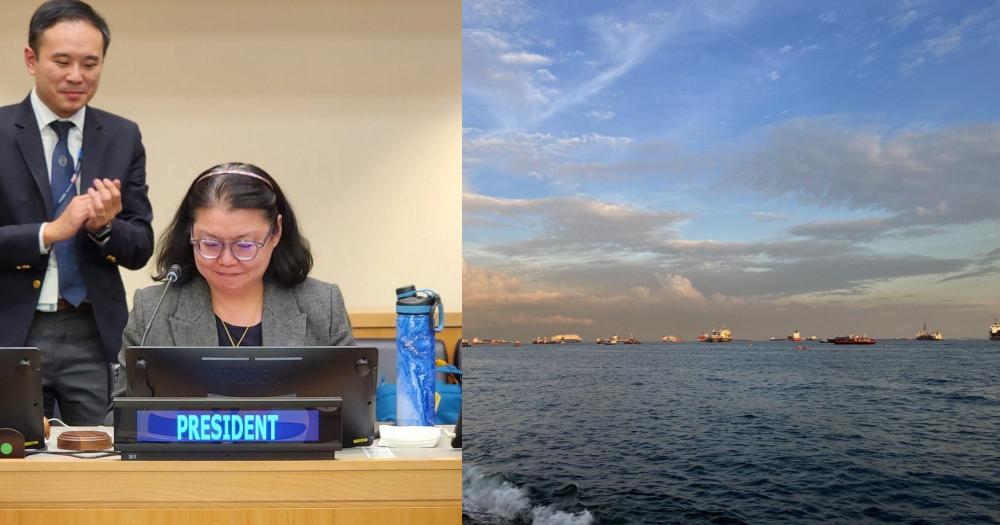Follow us on Telegram for the latest updates: https://t.me/mothershipsg
On Mar. 4, Rena Lee, Singapore's Ambassador for Oceans and Law of the Sea Issues presided over the successful conclusion of negotiations on a new United Nations Agreement.
Named the Marine Biological Diversity of Areas Beyond National Jurisdiction (BBNJ), it concerns the conservation and sustainable use of marine biodiversity beyond waters controlled by countries.
Come save the high seas
The BBNJ agreement comes under the United Nations Convention on the Law of the Sea (UNCLOS), whose conclusion was presided over almost 40 years ago by another Singaporean diplomat, Ambassador-at-large Tommy Koh.
The Intergovernmental Conference on Marine Biodiversity of Areas Beyond National Jurisdiction (BBNJ), presided over by Singapore’s Ambassador Rena Lee, successfully concluded negotiations on a new international agreement under the UNCLOS.
— MFAsg (@MFAsg) March 5, 2023
Read more here: https://t.co/W4jEfbW9Ip pic.twitter.com/yFuW8iNwOi
The agreement is on the conservation and sustainable use of marine biodiversity of areas beyond national jurisdiction.
This refers to the waters beyond national Economic Exclusion Zones that extend up to 370 km away from a nation's coastline.
According to the BBC, the BBNJ, also referred to as the High Seas Treaty, aims to safeguard and recuperate marine biodiversity by placing up to 30 per cent of the seas into protected areas by 2030.
While UNCLOS had previously designated international waters where all countries had the right to fish, ship, and research, only 1.2 per cent of those waters are protected.
The BBNJ agreement will put limits on fishing, shipping lanes, and exploration activities, such as deep sea mining.
Capacity building and research
The BBNJ agreement cover access to and use of marine genetic resources, the adoption and sustainable use measures, and capacity building and transfer of marine technology.
It also includes a commitment by developed countries to provide an additional 50 per cent of their annual financial contributions under the Agreement to fund capacity building projects.
This funding will help developing countries conserve and sustainably use marine biodiversity, as well as to implement the agreement.
The agreement also facilitates access to samples and data from scientific research from areas beyond national jurisdiction to researchers from both developed and developing countries.
Gruelling, marathon overnight efforts
The agreement comes after nearly 20 years of efforts, with initial discussions beginning as early as 2004.
Singapore has presided over negotiations since 2018.
Proud of Amb Rena Lee chairing #IGC2018 on new international agreement to conserve & sustainably use marine biodiversity in areas beyond national jurisdiction #BBNJ, looking forward to productive sessions ahead pic.twitter.com/THMT4iSkPJ
— Singapore Mission UN (@SingaporeUN) September 5, 2018
The Guardian described days of "gruelling round-the-clock talks", that saw an agreement emerge after three rounds of "final negotiations".
Lee said "the ship has reached the shore", as she announced that an agreement had been reached at 9:30pm on Mar. 4.
The deadline for an agreement was originally set for Mar. 3 but delegates had stayed overnight in order to finalise the agreement's wording, which now "cannot be significantly altered".
Dedicated efforts of countless persons
In a statement to the media, Lee thanked the "dedicated efforts of countless persons" for their commitment to "strengthening the protections" of high seas and deep seabed biodiversity.
But she also emphasised that this was not the end of the road, saying "Much more hard work lies ahead to achieve our objective, and I hope that the agreement gives a boost to such efforts. "
"But more than this, the conclusion of this agreement represents a strong affirmation that when nations come together, there is so much more that we can achieve collectively for the betterment of our world. I am privileged to have played a small part in these global efforts."
Multilateralism for small nations
An MFA spokesman framed the agreement in context of previous momentous Singaporean diplomatic efforts:
"Singapore welcomes the successful and timely conclusion of the BBNJ Agreement, which comes just after the 40th anniversary of the adoption of UNCLOS in 1982 under another Singaporean President, Ambassador-at-large Tommy Koh."
41 years after Ambassador Tommy Koh served as President of the Third UN Conference on the Law of the Sea which led to UNCLOS, another Singapore Ambassador, Rena Lee, has presided over successful negotiations on the UN High Seas Treaty. 🇸🇬🇺🇳 pic.twitter.com/2lZUU5X9u4
— Dhevarajan Devadas (@historyogi) March 5, 2023
The spokesman also emphasised that the success of the BBNJ international conference process "reaffirms the importance and relevance of UNCLOS, and multilateral cooperation."
This echoes sentiments expressed by Minister for Foreign Affairs Vivian Balakrishnan at the recent G20 Foreign Ministers' Meeting, where he also emphasised the importance of multilateralism and a rules based order to small nations such as Singapore.
Related stories
Top image via Ministry of Foreign Affairs & Tan Min-Wei
If you like what you read, follow us on Facebook, Instagram, Twitter and Telegram to get the latest updates.
